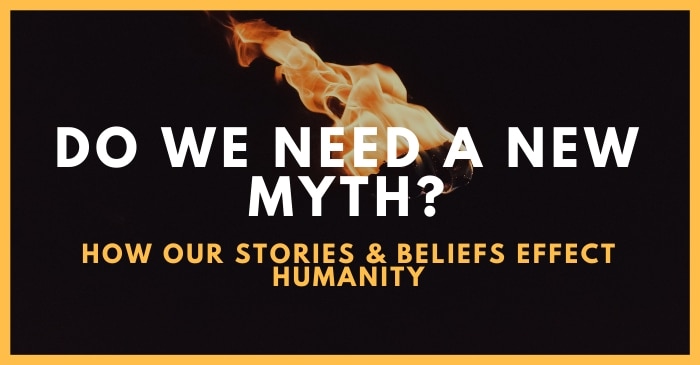WHY WE CONNECT TO MYTH
Mythology separates humans from the apes. The stories we create bring order to society and contribute to evolution and progress. Long before mankind built tools for transcribing information, we transferred knowledge through memory, and the use of story allowed for easy recollection.
But now that we’ve created tools like Google that vastly decrease the need for memory, myth still plays a prominent role in society today.
Why is this?
Perhaps this is because humans are storied creatures. We think of reality in terms of stories—each of us as the hero in our own drama, venturing out in search of the grail and slaying dragons along our path. The “about” page of every individual and company is now a story. History is written and recorded as if it were a story complete with protagonists, antagonists and plot development. We even expect the answers of the universe to be delivered to us in storied fashion, playing out as a cosmological battle in the stars, heavens or underworlds, each having an impact upon life on earth.
MYTH & PURPOSE

According to Joseph Campbell’s The Power of Myth, myth’s power serves a four-fold purpose for society:
- Mystical — myth attempts to explain the unknown (ex. creation stories, after-life and resurrection/rebirth)
- Cosmological — myth attempts to be scientific (ex. for pre-modern societies, explaining the changing of the seasons, planets and stars)
- Sociological — myth attempts to bring social order, ethical laws (ex. morality, “do not harm your enemies”)
- Pedagogical — myth attempts to give guidance for life stage transitions (ex. making the transition to adulthood and various physiological and psychological stages of growth)
The stories of mythology are not objectively representative of reality, but that doesn’t mean religious and spiritual myths are useless. Myths are still valuable as poetic metaphors and offer guidance to the inner-life.
Just like all belief systems, mythology has the potential to bring order to life’s chaos. Belief systems shape our reality and attempt to make sense of what measurement alone cannot. It’s why self-help gurus like Tony Robbins offer the advice that belief systems are central to making any real and lasting change in our lives.
WHY MYTHS LOST RELEVANCY
Myths can offer us great wisdom, but their Achilles heel is that, independently, these ancient texts are no longer relevant to the time in which we’re living today.
“Our time has changed so fast, what was proper 50 years ago is not proper today. Moral order has to catch up with the moral necessities of actual life in time, here and now.”— Joseph Campbell
Over time, myth has lost its relevancy. Scattered about mythology are outdated cosmological theories and sociological rituals that make myth difficult to accept in an era where rational thought and scientific thinking take precedence in value, and that loss of clarity creates division, doubt and skepticism.
As we transition to a digital world and connect on a global scale, we’re coming face to face with the realization that these mythologies can create division and conflict, thus straying from their original purpose — to unite and create order in the culture and the mind’s of the individuals.
MYTHS, INDEPENDENTLY, ARE INCOMPLETE
Traditional mythologies were written with one culture and one kind of people in mind, making unification across cultures a difficult task. Adopting a worldview through the lens of one myth is to see incompletely. It’s to see the world through one truth amongst many. Of course, this is philosophically debatable: are there many truths or is there one truth? Modern thinking seems to lean towards the latter to our own detriment. And how true are these stories anyways?
Campbell attempts to remedy this problem with the concept of the Mono-myth, an idea that there is a unified narrative that exists between all these stories, a common thread that unites them all. He cites as proof that eerily similar mythologies can arise in vastly different cultures, geographic areas and time frames.
THE FUTURE OF MYTH
There isn’t a clearcut solution for the rise of a new myth. The greatest hurdle for establishing a new myth is that people, places and events simply don’t have time to be mythologized in the fast-paced modern world. The result is that science and law have stepped in to fulfill the duties of myth, providing us the rules for how we should behave and make decisions.
If there’s a new myth to arise in the future, Campbell says it must be planetary. It will have to deal with what all myths that have come before have dealt with — the maturation of the individual (through dependency to adulthood, through maturity, then to exit), then how to relate society, and how to relate this society to the world of nature and the cosmos.
As technology continues to make promises to answer our questions here and now, most recently removing immortality from impossibility, machines and tech could play a large role in the new mythology. The idea that we’re living in the matrix, once popular only among philosophers, has now moved into the realms of sciences as a possibility.
The need for a new, uniting story remains. Until that time comes, humans will continue to turn to other tools like law, psychology and science to determine morality.
In the end, mythology is merely a tool for order. Just as knifes are used to both cook and kill, so too can myth be used to unite or divide. Many people find value in mythology, and their belief in these stories help them become better people, yet it seems some also use their stories to reinforce a dangerous moral compass.
Personally, reading these stories have helped me to become a more complex individual and aided in my inner-journey of self-discovery. However, I also see how myth has created disagreement, sectarianism and conflict in this world.
Are mythology and story still human’s greatest tools to unify, or will a new tool arise that makes our existing consciousness, ways of thinking, and need for story obsolete?





2 Comments
Leave your reply.